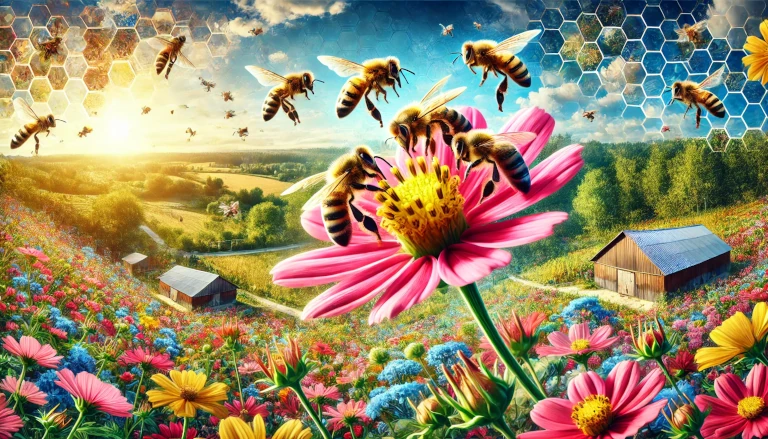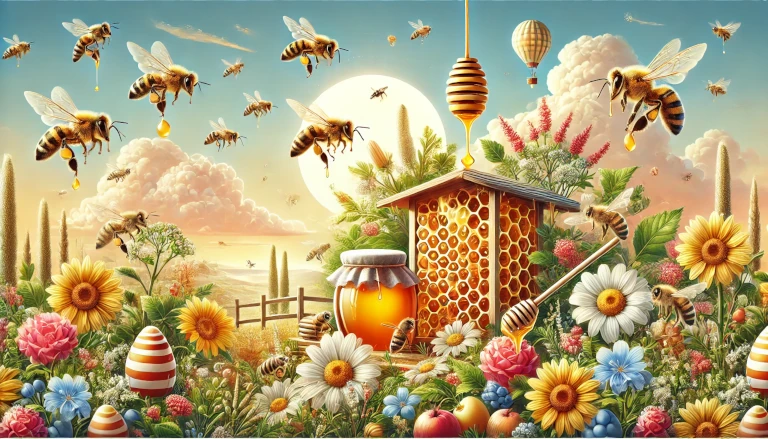Beekeeping is the practice of maintaining honeybee colonies for the purpose of harvesting honey, beeswax, and other products, as well as for pollination. It’s a rewarding and environmentally friendly activity that can be enjoyed as a hobby or a business. By raising bees, beekeepers contribute to the health of ecosystems, as honeybees play a crucial role in pollinating plants and supporting biodiversity.
In this blog post, we’ll explore the basics of beekeeping, including what it entails, how to get started, and the benefits of keeping bees. Whether you’re interested in producing your own honey or supporting local ecosystems, beekeeping offers a unique way to connect with nature and contribute to the environment.
What is Beekeeping? 🐝🌼
Beekeeping, also known as apiculture, is the practice of caring for honeybee colonies in man-made hives. Beekeepers, often called apiculturists, manage the bees, ensuring their health and providing them with a suitable environment to produce honey and pollinate plants. The primary goal of beekeeping is to harvest honey and other bee products, but it also supports the pollination of nearby plants, which is essential for food production and maintaining biodiversity.
Benefits of Beekeeping for the Environment 🌍🍯
Beekeeping offers several benefits for both beekeepers and the environment. Here are some key advantages:
1. Supports Pollination and Biodiversity 🌸🦋
Honeybees are essential pollinators, helping plants reproduce by transferring pollen from flower to flower. By keeping bees, you can support the pollination of local plants, which is crucial for the growth of fruits, vegetables, and flowers. This helps maintain biodiversity and supports healthy ecosystems.
2. Produces Natural Honey and Beeswax 🍯🕯️
Beekeeping allows you to harvest natural honey, which is not only delicious but also packed with antioxidants and nutrients. In addition to honey, bees also produce beeswax, which can be used to make candles, lip balms, and other natural products.
3. Promotes Environmental Awareness 🌍💚
By practicing beekeeping, you become more connected to nature and gain a better understanding of the environment. Beekeepers often develop a deep appreciation for the role that bees play in our ecosystems and become advocates for bee conservation.
How to Get Started with Beekeeping 🐝🌞
If you’re interested in starting beekeeping, there are a few essential steps to consider:
1. Learn the Basics of Beekeeping 📚🐝
Start by reading books, attending local beekeeping classes, or joining a beekeeping association. Learning about bee behavior, hive management, and honey harvesting will help you become a knowledgeable beekeeper.
2. Choose the Right Hive Type 🏠🌼
There are several types of beehives, but the most common for beginners are the Langstroth hive and the Top-bar hive. Langstroth hives are structured with removable frames, making honey extraction easier, while top-bar hives are simpler in design and more natural for bees.
- Example: A Langstroth hive is ideal for beginners who want to produce honey, as it allows for easy inspection and harvesting.
3. Purchase Bees from a Reputable Source 🐝🏬
You can buy bee packages or nucleus colonies (nucs) from local suppliers. A nuc is a small colony of bees with a queen, workers, and brood, making it easier to establish your hive.
4. Set Up Your Hive Location 🏞️🌺
Choose a suitable location for your hive. It should be in a sunny spot with some shade, away from high-traffic areas. Bees need access to flowers for nectar and a nearby water source.
5. Provide Hive Care and Maintenance 🛠️🧹
Beekeeping requires regular hive inspections to monitor bee health, check for diseases, and manage the colony. You’ll also need to provide feeding, shelter, and protection from predators.
Beekeeping Equipment Essentials 🧰🐝
To get started with beekeeping, you’ll need some basic equipment:
- Bee Suit and Gloves: Protect yourself from stings while working with the bees.
- Bee Smoker: Smoke helps calm the bees during hive inspections.
- Hive Tool: Used for opening the hive and separating frames.
- Honey Extractor: A device that extracts honey from the comb without damaging it.
Common Challenges in Beekeeping 🐝🌧️
Beekeeping is rewarding, but it also comes with challenges. Here are some common issues beekeepers face:
1. Varroa Mites and Pests 🐜🦟
Varroa mites are parasites that can harm bee colonies. Regular inspections and treatments are necessary to prevent infestations.
2. Swarming 🐝🌬️
Swarming occurs when a colony divides to form a new one. It’s a natural process, but can reduce honey production. Keeping your hive healthy and well-maintained can help minimize swarming.
3. Weather Conditions 🌧️🌞
Bees are sensitive to weather changes. Cold winters and hot summers can affect hive productivity. Proper hive management can help keep the bees healthy through seasonal changes.
Real-Life Example: Urban Beekeeping 🏙️🐝
Urban beekeeping is becoming increasingly popular as more people set up hives in city environments. Rooftop gardens, balconies, and backyards can all be used for beekeeping, provided there’s access to flowers. Urban beekeepers help improve local biodiversity by supporting pollinator populations in urban areas, and they often find that their bees produce unique and flavorful honey thanks to the diverse floral sources.
The Future of Beekeeping 🌍💡
Beekeeping plays a critical role in addressing bee population decline and ensuring the pollination of crops. With growing awareness of the importance of bees, more people are taking up beekeeping as a way to support the environment and contribute to sustainable food production. As a beekeeper, you can make a difference by promoting bee health, pollinator-friendly practices, and environmental conservation.
Beekeeping for a Sustainable Future 🐝🌍
Beekeeping offers an opportunity to connect with nature, produce natural honey, and support the environment. By starting your own hive, you not only enjoy the rewards of fresh honey but also contribute to biodiversity and pollinator health. Whether you’re interested in beekeeping as a hobby or looking to make a positive impact on the planet, raising bees is a fulfilling and environmentally friendly practice.
If you’re ready to start your beekeeping journey, follow these steps and enjoy the process of learning, growing, and contributing to the ecosystem through the art of beekeeping.
Discover more from Green Ecosystem - Renewable Energy, Agriculture, and Environmental Sustainability
Subscribe to get the latest posts sent to your email.


